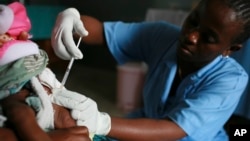The World Health Organization reported the agency would begin testing a promising malaria vaccine in October to see if it should be used in African countries affected by the parasitic disease.
WHO said it would issue its recommendations in November.
It called the development of this possible vaccine a major milestone, noting this is the first time that a malaria vaccine has been reviewed by a regulatory authority.
On Friday, the European Medicines Agency issued a positive assessment of the GlaxoSmithKline vaccine called Mosquirix, essentially giving the WHO the green light to review the product for its use in Africa.
Positive step
WHO spokesman Gregory Hartl said this is a big step forward and the health agency will look at the new vaccine from the point of view of public health.
“What we will need to do is look at issues such as the feasibility of using this vaccine in field situations in developing countries," Hartl said.
"We need to look at its affordability and its cost effectiveness. We will also need to look at the public health value of the vaccine in relation to other malaria-controlled measures," he said.
Scientists have been searching for an effective vaccine against malaria for decades.
Mosquirix is the first one that has gone through a phase 3 trial, which compares a new treatment with the standard treatment in a large group of people.
Malaria infects 200 million people worldwide every year and kills nearly 600,000 -- most of them children under the age of 5 in Africa. If the vaccine is proven to work, health officials believe it could potentially save millions of lives.
Clinical test results
Clinical trial results show the vaccine offers only partial protection, preventing one in three cases of malaria. Children between the ages of 5 and 17 months who received three doses of the vaccine one month apart, with a booster shot several months later, were the best protected.
The trial found the vaccine to be less effective among infants between 6 and 12 weeks of age.
WHO’s Hartl cautioned against pinning too much hope on the vaccine. Despite its promise, he said the vaccine must not take precedence over tried-and-true malaria-control measures.
“We just want to stress that any financing for this vaccine has to not draw away resources from other interventions such as scaling up bed nets and rapid diagnostic tests for malaria," Hartl said.
"The malaria vaccine needs to be reviewed and will be reviewed within the context of an overall panoply of public health tools for the combating of malaria," he said.
If the WHO’s assessment of the vaccine is positive, Hartl said applications for its use will have to go forward to national regulatory authorities for approval.
He said this process is likely to be completed, at the earliest, in 2017.




